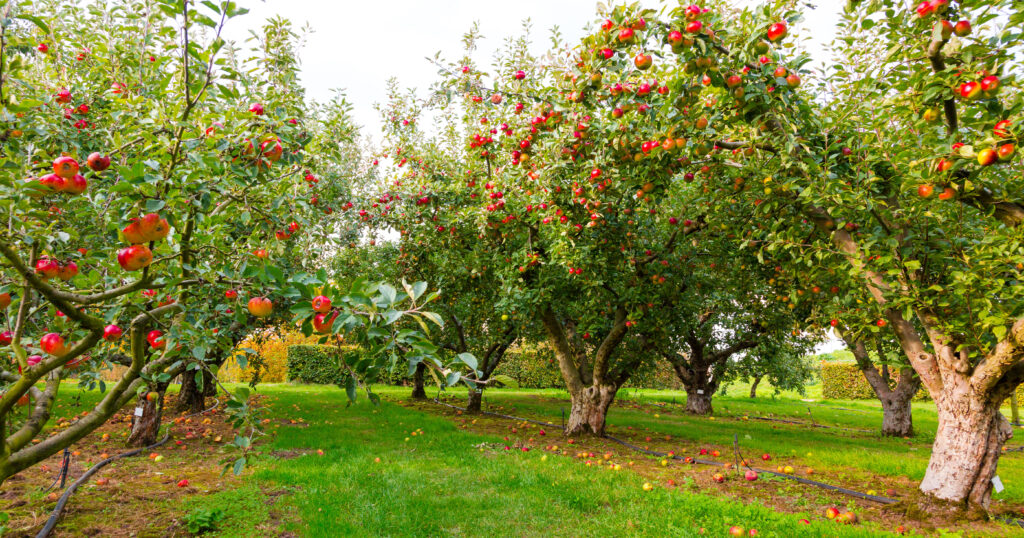The October 2025 issue of The Lutheran Witness provided definitions and explanations of nine different words we use often as Lutherans — and unpacked how other denominations use those terms differently. We are sharing several of these online throughout the month of October.
Definition:
Good works are actions in accordance with God’s will, taken by the Christian not from fear of punishment or for worldly gain, but as an intrinsic part of the Holy Spirit’s work of sanctification.
Lutherans Confess:
Are good works necessary? Yes, say the Lutheran Confessions, but not for meriting salvation (FC Ep IV; FC SD IV). Good works are not what save us — Jesus alone saves us. But good works are absolutely a critical part of life as a Christian — not as something done to appease God or earn His favor, but as tasks prepared for us and worked through us by the Holy Spirit (Eph. 2:10).
Paul says it clearly: “For by grace you have been saved through faith. And this is not your own doing; it is the gift of God, not a result of works, so that no one may boast” (Eph. 2:8–9). And yet, good works are still a frequent topic in Scripture.
During the Sermon on the Mount, Jesus warns against false teachers:
You will recognize them by their fruits. Are grapes gathered from thornbushes, or figs from thistles? So, every healthy tree bears good fruit, but the diseased tree bears bad fruit. A healthy tree cannot bear bad fruit, nor can a diseased tree bear good fruit. Every tree that does not bear good fruit is cut down and thrown into the fire. Thus you will recognize them by their fruits. (Matt. 7:16–20)
A tree does not become a tree by bearing fruit, nor does it actively will its fruit. Bearing fruit is, by nature, what a tree does. Thornbushes and thistles can’t produce fruit — they only produce thorns and thistles. But a fruit tree can sicken and cease to bear fruit, at which point it is no longer acting like a fruit tree and instead is “thrown into the fire.” The lack of fruit is a sign of something more sinister, like a deathly fungus or bore, which, left untreated, could spread and destroy the whole orchard — like a false teacher could lead astray a group of Christians.
Just as the healthy tree produces healthy fruit, the “healthy” Christian produces good works. These good works are not something the Christian does on his own, though. During Jesus’ Maundy Thursday discourse, He says:
I am the true vine, and My Father is the vinedresser. … As the branch cannot bear fruit by itself, unless it abides in the vine, neither can you, unless you abide in Me. I am the vine; you are the branches. Whoever abides in Me and I in him, he it is that bears much fruit, for apart from Me you can do nothing. If anyone does not abide in Me, he is thrown away like a branch and withers; and the branches are gathered, thrown into the fire, and burned. (John 15:1–6)
The branch produces fruit because it is connected to the vine; cut off, it withers and dies. Further, Jesus says that he who “does not abide” in Him is cut off — the branch that is not producing fruit, then, is doing so because it is not abiding in Jesus, and it has been long dead by the time the vinedresser throws it into the fire. Good works are a result of abiding in Christ; a branch disconnected from the vine cannot produce fruit, and a person without faith cannot perform good works.
It is through these words of Jesus that we can then understand what is considered by some Lutherans to be a bogeyman verse, James 2:17: “So also faith by itself, if it does not have works, is dead.” We do not need to fear or avoid this verse. It simply reiterates what we receive from the mouth of Jesus in the Gospels: Good works proceed from faith in Christ; the faith that produces good works does so because of Jesus; and the faith that does not produce good works is dead, because it is apart from Christ.
Unpacking Other Definitions:
- Works-righteousness: The crassest misunderstanding of good works is the teaching that good works merit salvation apart from Jesus’ atoning work, known as works-righteousness. This is a teaching so egregious that it has been condemned by church bodies across history; and yet, watered down versions of this teaching have always plagued the church. The Roman Catholic Church has never officially taught that a man is justified by his works — this is explicitly condemned in the Council of Trent. However, the Catholic Church does officially hold that the Christian does good works that God counts as righteous and meriting salvation because of Christ (see CCC.2008). Christians, therefore, receive “the recompense of God their Father for the good works accomplished with his grace in communion with Jesus” (CCC.2016). In contrast to this, confessional Lutherans teach that good works are necessary, not as meriting salvation, but as a natural outcome of the Holy Spirit dwelling in the Christian.
- Progressive sanctification and moral perfection: Other denominations teach that, as a Christian, you must progress in your sanctification through your own work, potentially to the point of moral perfection. Increasing in good works is a good thing; our Lord says that God prunes the fruit-bearing branch “that it may bear more fruit” (John 15:2). However, teaching that moral improvement — or worse, moral perfection — is necessary to salvation is a dire confusion of sanctification and justification. This teaching can be found in church bodies like the Methodists, Nazarenes, some Pentecostals and other holiness movements, and teachers like Joyce Meyer. Meyer, who was raised LCMS, once described the general confession spoken at the beginning of the Lutheran Divine Service: “All I was ever taught to say was, ‘I’m a poor, miserable sinner.’ I am not poor, I am not miserable and I am not a sinner. That is a lie from the pit of hell.” Rather than teaching this sort of moral perfectibility, the Bible has myriad examples of God’s saints confessing their sinfulness (see 1 Tim. 1:15; Psalm 51:10).
- Fruit checking: Some groups, especially those coming out of a Calvinist or Reformed background, engage in a behavior commonly referred to as “fruit checking.” This is a practice whereby Christians ruminate on the quantity and quality of their good works to determine whether they are in good standing with God or are falling away from the faith. This kind of hyperfixation on our work instead of on Christ is not beneficial. Lutherans confess that just like the apple tree cannot will additional fruit, or the vine compare its grapes to another’s, the Christian should focus instead on Christ, the very Vine who gives us His life, and cheerfully accept those good works that God has willed for us, rather than thinking we can do better apart from the Holy Spirit’s work.
From Scripture:
“For we are His workmanship, created in Christ Jesus for good works, which God prepared beforehand, that we should walk in them” (Eph. 2:10).
From Our Confessions:
“After man has been justified through faith, then a true living faith works by love (Gal. 5:6). Good works always follow justifying faith and are surely found with it — if it is true and living faith. Faith is never alone, but always has love and hope with it” (FC Ep III 11).






A seminal article … But on Works-Righteousness: it’s not dead; just equivocated around (Council of Trent, notwithstanding) and being preached on the flip-side of Justification by LCMS.
But briefly, if I hear one more closet papist cite “James” to me, I think I am going to scream (though I take your point of the vine and the branch)! James the “epistle of straw” that Luther characterized as “viel guter Sprueche”, “some good spray” or “some good sayings”, but little else. Who, kept the book in his canon effectively as New Testament Apocrypha, and that “only the Popists accept James” with “Ich werde einmal mit dem Jekel den offen heizen” (Someday I will use James to fire my stove). Luther all but banned it from being taught at Wittenberg. I can agree with his observations and actions.
Flanagan obviously has not grasped the article clearly, nor digested the message of Eph2:8-10. Nor, indeed, heeds the admonition of Matt. 7:16-20. In fact, he would be better informed by James3:6, 11 than the James2 section to which he alludes, and which absolutely contradicts Eph2:8-10. Next, we will hear (as has been preached to me lately; LCMS) that one is in peril of the Narrow Door slamming in ones face and one is headed to Hell, if after Justification, one’s “works” are not deemed worthy enough, “just not good enough” (just how much would ever be enough, good enough?), or that they haven’t been dangled about like some freshly caught wet mackerel on a shiny lure! Sound familiar? Indulgences anyone?
Anyone who insists on this, I contend, denies the Holy Spirit’s workings and blasphemes against it (as does this “James” author looking for signs, like the Pharisees). In like manner, so to the insistence on “fruit checking” and dissecting such works that are entirely the province of the Spirit. Who, will take as long as necessary to affect; evident (or not) as needed to work a lifetime of sanctification (Matt 7:1-2, 6). He will show you what He needs to show you in His own time (Romans 8:16); you will recognize it for what it is … or, when and if it is a dead branch.
As to “fearing” James2:17 …? I fear that it will not be abandoned soon enough. Its mis-use becoming far to prominent as a cuddle excuse to preach hell-fire, damnation; invite potential abuse, on a slippery-slope of indulgences and percentages, a papist road to ruin.
… Just a thought …
We must be careful to understand the meaning of God’s grace, and we are cautioned by Holy Writ to not abuse it as well. Indeed, we are saved by grace alone, not by our works, but there is in God’s drawing us a visible result, a transformation and change. This change is a fruit of salvation, a desire to please the Lord, and do works fitting this call. James says, “Show me your faith by your works.” There need not be confusion. We know that “salvation is of the Lord,” and that no one can come to Jesus unless the Lord draws them. We contribute nothing to our salvation. This is entirely scriptural. But “cheap grace” is a view that diminishes the grace of God and makes the believer think that no real change in themselves is needed, that the sanctification of one’s soul is not urgent. A correct understanding of the Gospel message of salvation is essential. Soli Deo Gloria
“[Christ] gave himself for us to redeem us from all lawlessness and to purify for himself a people for his own possession who are zealous for good works” (Titus 2:14).
“And he died for all, that those who live might no longer live for themselves but for him who for their sake died and was raised” (2 Cor. 5:15).
So good works are not merely a consequence of being forgiven for one’s wayward past, but also reflect the comprehension of a new and blessed calling looking forward. And God desires that we undertake good works not tepidly, but with zeal, for he is glorified (John 15:8) and we find joy (John 15:11) in the doing!
Because of the way God created us (Genesis 1) and re-created us (Eph. 2:10), doing good works with a generous spirit is fundamentally fulfilling and rewarding! Indeed, “It is more blessed to give than to receive” (Acts 20:35).
————-
Is it only in pardoning a lifelong criminal that he becomes prepared and willing to live an upright and productive life? Of course not.
It seems to me that for someone to be fruitful in doing good works, he will need to —
• know what good works are — as a result of being told (Micah 6:8), Christ’s example (1 Peter 2:21), “training in righteousness” (2 Tim. 3:6), and “practice” (Heb. 5:14).
• have incentive to do good works — with gratitude for God’s grace in Christ, respect for God’s stature and authority, an appreciation for the blessings that accrue as his commands are followed, a sense of godly calling, a sanctified conscience, an awareness of rewards both experienced and promised, the gentle nudging of fellow believers (Heb. 10:24), etc.
• have the ability to do good works — because of God’s gifts (Romans 12:6, 2 Peter 5:1-11).
• have the opportunity to do good works — as for “the least of these” (Matthew 25:35-40).